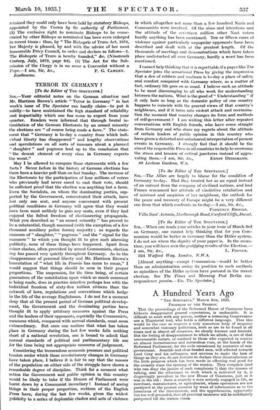TERROR IN GERMANY
[To the Editor of THE SPECTATOR.]
Sin,—Your editorial notes on the German situation and Mr. Harrison Brown's article " Terror in Germany " in last week's issue of The Spectator can hardly claim—to put it mildly—to have maintained the high standard of reliability and impartiality which one has come to expect from your quarter. Headers were informed that through brutal in- timidation of the German Electorate by an armed minority the elections are " of course being made a farce." The state- ment that " Germany is to-day a country from which indi- vidual liberty has disappeared " and lengthy observations and speculations on all sorts of rumours about a planned " slaughter " and pogroms lead up to the conclusion that "the decent element of every class in Germany expects the worst."
May I be allowed to compare these statements with a few facts ? Never before in the history of German elections has there been a heavier poll than on last Sunday. The increase of the Electorate by the participation of four millions of voters who previously had never cared to cast their vote, should be sufficient proof that the election was anything but a tame. Even the Socialists, on whom the dominating parties, sup- ported by the Government, concentrated their attack, have lost only one seat, and anyone conversant with present political conditions in Germany will agree that they would have been most unlikely to gain any seats, even if they had enjoyed the fullest freedom of electioneering propaganda. What you described as " an armed minority " has proved to be -a substantial, though unarmed (with the exception of a few thousand auxiliary police forces) majority ; as regards the rumours of " slaughter," " pogroms " and the " signal for the massacre " to which you thought fit to give such alarming publicity, none of these things have happened. Apart from minor clashes, often provoked by armed Communists, election day has passed very quietly throughout Germany. As to the disappearance of personal liberty and Mr. Harrison Brown's lamentation of " what life in Prussia has come to mean," I would suggest that things should be seen in their proper proportions. The suspension, for the time being, of certain guarantees of the constitution upon which so much comment is being made, does in practice interfere perhaps less with the individual freedom of sixty-five million citizens than the network of laws, regulations and conventions which hedge in the life of the average Englishman. I do not for a moment deny that at the present period of German political develop- ment, the Government and the dominating parties have thought fit to apply arbitrary measures against the Press and the leaders of their opponents, especially the Communists, measures which, compared with normal standards, must seem extraordinary. But once one realizes that what has taken place in Germany during the last few weeks falls nothing short of a national revolution, one is bound to admit that normal standards of political and parliamentary life are for the time being not appropriate measures of judgement.
Considering the tremendous economic pressure and political tension under which these revolutionary changes in Germany have taken place, I believe it is fair to say that the masses of the population on either side of the struggle have shown a remarkable degree of discipline. Think for a moment what action the Government and public opinion in this country would be likely to take if the Houses of Parliament were burnt down by a Communist incendiary l Instead of seeing things in their proper proportion, sections of the English Press have, during the last few weeks, given the widest Publicity to a series of deplorable clashes and acts of violence in which altogether not more than a few hundred Nazis and Communists were involved. Of the aims and intentions and the attitude of the seventeen million other Nazi voters hardly anything has been mentioned. Ten or fifteen eases of violence against particularly unpopular opponents have been described and dealt with at the greatest length. Of the thousands of-meetings and demonstrations which have taken place undisturbed all over Germany, hardly a word has been mentioned.
I cannot help thinking that it is regrettable if a paper like The Spectator joins the sensational Press by giving the impression that a den of robbers and madmen is to-day a place of safety and comfort compared with Germany where, as a matter of fact, ordinary life goes on as usual. I believe such an attitude - to be most discouraging to all who work for understanding between the nations. What is the good of " Understanding " if . it only lasts so long as the domestic policy of one -country • happens to coincide with the general views of that country's • neighbours, and if it turns into violent attack and recrimina- tion the moment that country changes its form and methods of • self-government ? I am writing this letter after -repeated . conversations with English friends, who have come. straight
• from Germany and who share my regrets about the attitude of certain leaders of public opinion in this country who . have given a distorted and unbalanced interpretation of present events in Germany. I strongly feel that it should be the aim of the responsible Press in all countries to help to overcome the stress and tension of critical -junctures instead of aggra-
vating them.—I am, Sir, &e., ERNST Daissistaxsr. 89 Lexham Gardens, W.8.






































 Previous page
Previous page